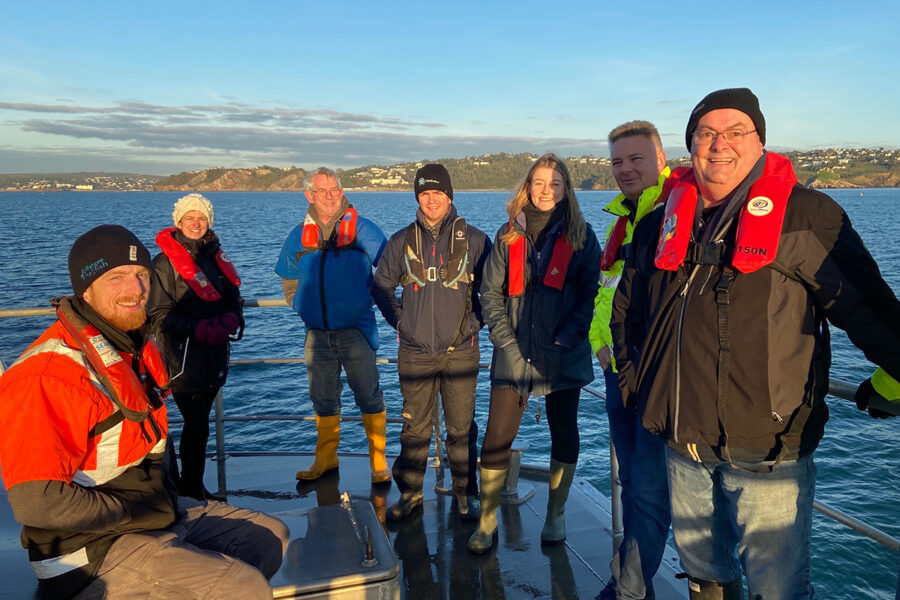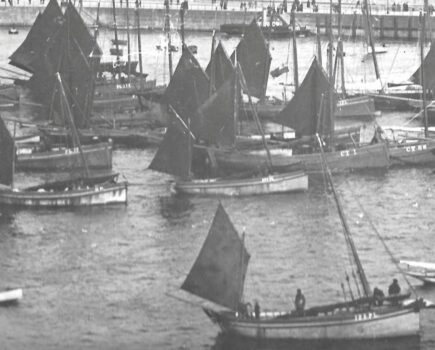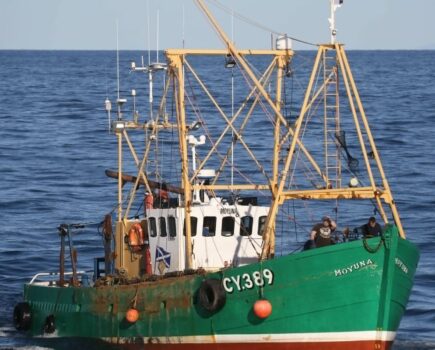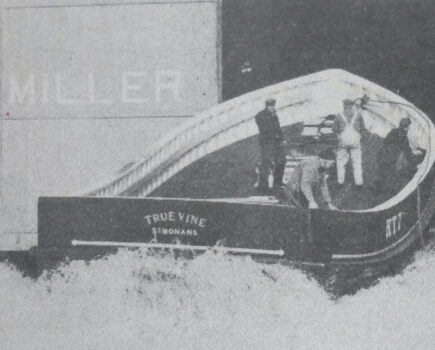The Shellfish Association of Great Britain team report on the end of a busy year
The farmed shellfish industry has long bemoaned the lack of government understanding of, and support for, the sector, which is internationally recognised as one of the most sustainable, environmentally friendly ways to produce animal protein for human consumption.

In reply, the government claims to support industry-led growth – yet all obstacles to such development lie firmly in the hands of the same regulators.
The All Party Parliamentary Group on Shellfish Aquaculture, set up earlier this year with help from MPs Simon Fell and Anthony Mangnall, with the SAGB as secretariat, aims to bring the many issues faced by the sector to the direct attention of politicians, with a view to influencing future policy.
At the next meeting, water quality will be firmly on the agenda, as pollution impacts severely on shellfish production. SAGB is pressing for shellfish harvesting waters to be protected from pollution, and for water companies to be held accountable for discharges of sewage into the oceans, using a ‘polluter pays’ principle.
Currently, there are rarely consequences for the polluters, and even when companies are fined, the money is not used to compensate affected businesses.
The Food Standards Agency (FSA) and consultants Carcinus joined SAGB and the local environmental health officer in early December on a visit to the Offshore Shellfish sites in Lyme Bay, to look at the unique challenges of producing a relevant sanitary survey for an offshore mussel farm.
Given that offshore mussel production is highlighted in the English Aquaculture Strategy as the principal way forward for the sector, and already accounts for the majority of mussels farmed in England and Wales, it is vital to ensure that a proper risk-based analysis is undertaken.
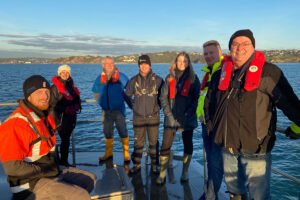
SAGB representatives, including chief executive David Jarrad (right), with staff from the FSA and consultants Carcinus, on a December visit to Offshore Shellfish sites in Lyme Bay. Offshore Shellfish managing director John Holmyard is third from the left.
Progress is vital, given that the latest data from Cefas shows that in the seven years to 2020, mussel production in Wales fell by 99.5% and in England by 30%. Brexit has played a large hand in this.
The visit was probably a significant eye-opener for the FSA in terms of the scale of operations, and its distance from any source of anthropogenic pollution. However, despite the distance from shore and the high dilution factors, there are still unexplained peaks in numbers of E coli as found by the currently used testing methods, which in turn affect the water classification and the farm’s ability to export. The interpretation of these results sets England apart from Europe and continues to severely endanger the vital post-Brexit export market.
The Shellfish Stakeholders’ Working Group, facilitated by Seafish and chaired by SAGB, is a key industry forum that is working on the classification issue, amongst other concerns. It is examining the classification system and alternative interpretations of regulations and current test methods, with a view to bringing the UK more into line with the systems already approved for use in Europe.
Electronic certification
For the past couple of months, Defra has been working closely with a fish export hub as part of the first phase of its Expanded Fish Pilot, to test exports of fish, shellfish and live bivalve molluscs to the Boulogne-sur-Mer border control post using digital Environmental Health Certificates (EHCs).
These tests have been used to establish the system’s ability to process volumes of electronic EHCs and to assess technical and end-user operability. As a result, a number of technical issues have been rectified by the digital development team, and further system and business operational requirements have been identified.
Defra has also been running other GB-EU fish destination pilots, including successful pilots of fish exports to Caen, and scallop and salmon exports to Boulogne-Sur-Mer. Planning is underway to host further pilots, and to work with traders to test EHC 8364 on exports of live bivalve molluscs, echinoderms, tunicates and marine gastropods through Caen and Roscoff border control posts before the end of the year.
SAGB welcomes James Wilson
James Wilson has recently joined the SAGB team part-time as a project manager, and will initially work on a FaSS-funded water quality project. James will provide advocacy and collaborate with other organisations in the UK and across Europe, to continue our quest for improvements in water quality, which will ultimately benefit the entire shellfish community.
James will be known to many in the industry as a long-time member of SAGB, a board member and a past Mollusc Committee chair. He holds degrees in marine science, economics and law, runs a mussel company in North Wales, works with Bangor University on research projects, and is extremely knowledgeable about the wider shellfish industry. James is also a former board member of Seafish, the Welsh Food and Drink Industry Board and the Food Standards Agency Welsh Food Advisory Committee
Join SAGB!
If you are involved in any aspect of shellfish production and are interested in the work of SAGB, we would love to have you onboard as a member, to help us become a more powerful and unified lobbying voice. The more people that are involved, the more influence we can achieve. We have categories for catchers and growers, industry professionals, trade, restaurants, academics, students, international organisations or individuals, and also for anyone with a passion for shellfish.
To find out more, go to: shellfish.org.uk
This story was taken from the latest issue of Fishing News. For more up-to-date and in-depth reports on the UK and Irish commercial fishing sector, subscribe to Fishing News here or buy the latest single issue for just £3.30 here.

